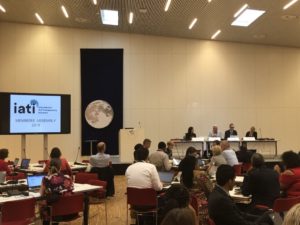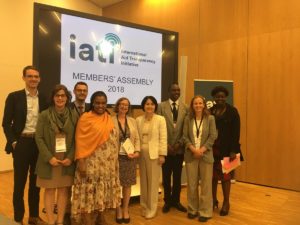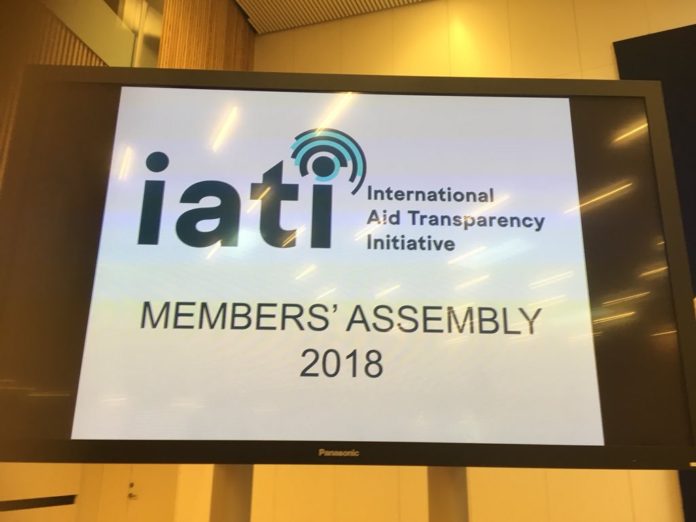By Winnie Kamau
I was honored to be part of the just concluded Members Assembly of International Aid Transparency Initiative (IATI) which is a Multi-Stakeholder meeting held in UN City in Copenhagen, Denmark.
The meeting that is held annually saw Governments, Multilateral donors and Civil Society Organizations (CSOs) converged as we looked at the various issues that had been passed during the Last Assembly which was held in Rome, Italy in 2017.
I need to mention that IATI was formed 10 years ago in 2008 with an aim to show how aid money was being used and how it reached the recipients. IATI started with a few publishers publishing in their registry and now it has 800 publishers.
So the Agenda at the Members Assembly (MA)had the introduction of the new Governing board which is now headed by with Theo Van Sande representing the Netherlands.

We had the Data Use Task Force (DUTF) team led by John Adams of DFID give an update on the overview of the implementation of the Data Use Strategy and gave an update on the implementation of the Data Use Fund. A recent call for proposals on the Use of Data had been rolled out and so far four countries had won including Uganda and Ghana out of 31 proposals that had been received. The DUTF taskforce is still in the process of evaluation and will be making more announcements.
A proposal on the deprecation of the v.1 of the Standard with the Technical priorities of IATI presented by Bill Anderson of Development Initiatives (DI). From my humble observations, the Technical team led by DI has been doing some amazing work. It’s not easy to standardize the data with the many publishers. But things are looking up. A case in point during the last Technical Advisory Group (TAG) meeting held in Dar es Salaam last year saw an ask the Tech team led by DI, to allow more options of download of data in friendly formats like CSV away from the XML and this was implemented. A Technical Audit by IATI experts will be undertaken and the report to be tabled during the next MA.

Association of Freelance Journalists (AFJ) was privileged to be part of a Panel that showcased the use of data. AFJ partnered with UNDP and participated in the World Press Freedom Day (WPFD) held in Accra Ghana in May 2018. Here AFJ led by Winnie Kamau taught 40 Young International Journalists the Use of data in telling stories and how IATI data was useful. Winnie also taught the use of D-Portal which is a visualizing tool of IATI data.
Others on the panel included the Horia Sohir of Africa Development Bank (AfDB) who presented on a Map Africa Portal which they had developed that helped visualize the IATI Data they publish on IATI Registry. This allows one to see how much AfDB has funded and to whom the money has been given to and how it has been spent.
James Coe of Publish What You Fund (PWYF) shared his journey as they did a study using IATI Data on the impact of United States cutting down on aid funding in various countries. From the study, James acknowledged there were other repositories but IATI Data Registry came out more useful to his study than the rest.
Aria Grabowski of Oxfam America presented her story using IATI Data in Uganda. Aria teamed up with Oxfam Uganda and they were able to convene Civil Society Organizations and different publishers and Media and taught them how to use IATI data Using the D-Portal. There was a need to educate more people on the power and use of IATI Data in the grassroots.
Thea Scheppers of Plan Nederlands took us through an initiative Plan had formed with other 5 organizations on fighting early child marriages, ending FGM and Teen Pregnancy. The five organizations formed Yes I Do Alliance (YIDA) and a portal using IATI data they are able to see the impact of their funding and monitor where best their funding should be placed or allocated. The data has been Visualized using Power BI dashboard.
The new IATI Website was launched and new key features presented and explained to participants. This is a key tool underpinning all other data use, communications and outreach activities, bringing together information previously distributed across a number of different websites.
Based on the outcomes of the 2017 Members’ Assembly, an Institutional Review Working Group (sub-group of the Governing Board) was mandated to present options for a future governance and management structure of IATI at the 2018 MA. An independent analysis in consultation with Consultants and 4 recommendations were presented for adoption.
The Members’ Assembly agreed to the recommendation mandating the Governing Board to
elaborate the details of the transition and develop a three-year strategic plan; This should
be undertaken in close consultation with the Secretariat, with UNDP leading this work; the
plan should be ready for presentation to members at the 2019 MA.














